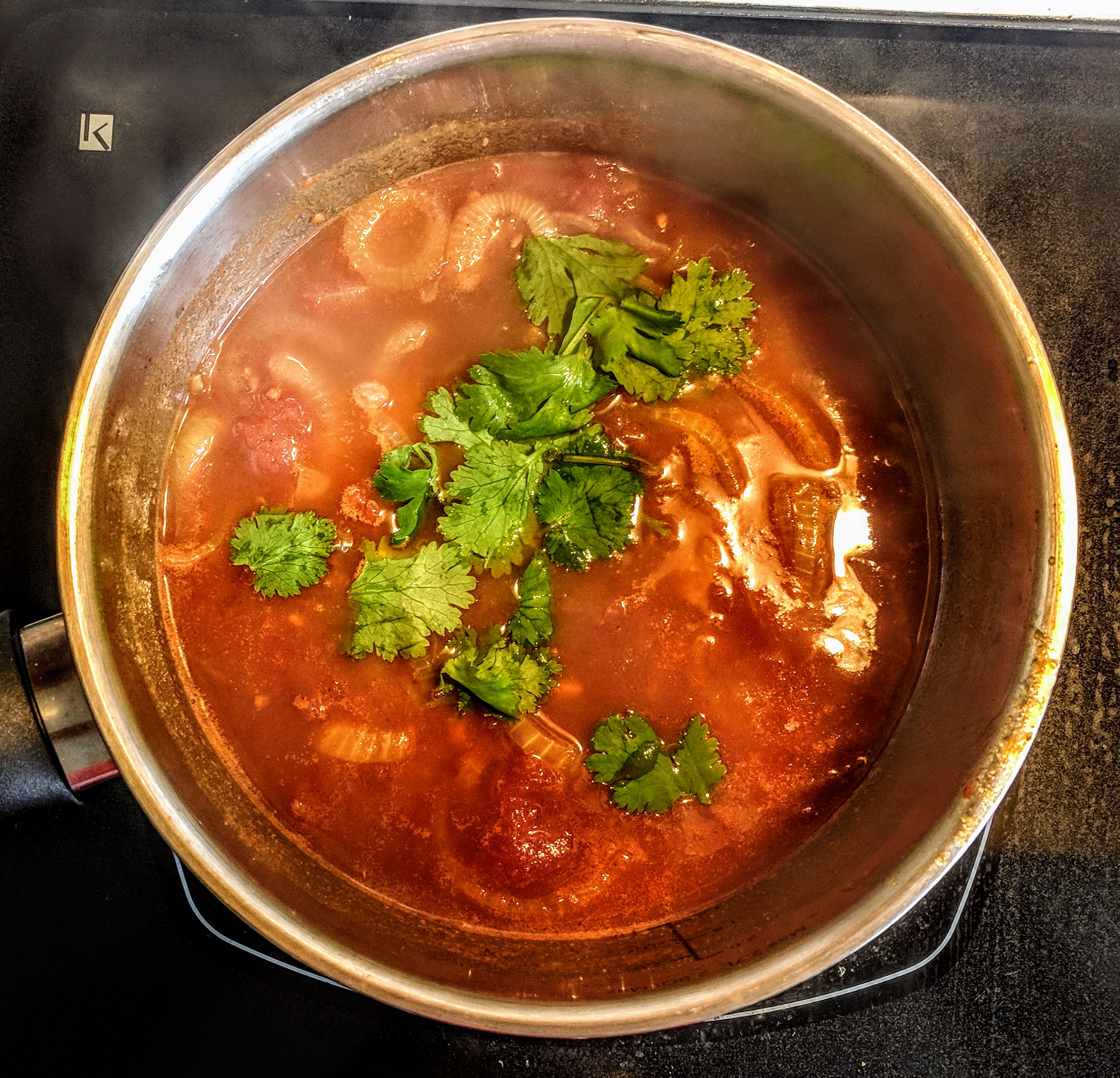
How do you make tomato curry or tomato khatta?
Another one of my mother’s recipes that she makes from “cooking muscle memory” is tomato curry or tomato khatta. It seems simple when you see it dished out or in a pot, just a tomato soup looking dish but it’s a lot more than that! One thing I am noticing about all her recipes so far are a common few ingredients. In particular the chopped onion and garlic fried in oil and also the set of spices: grown ginger, garlic and turmeric and to which is added chili powder in this case.
Cilantro is an interesting ingredient, interesting because I had a hard time finding it in the store. It seems cilantro and coriander come from the same place species, Coriandrum sativum. But they are named differently in different parts of the world and/or are different parts of the same plant. For examples, in North America the leaves and stalks of the plant are called cilantro while the dried seeds are called coriander. In other parts of the world, however, coriander is the names given to the leaves and stalks of the plant and the seeds called coriander seeds, which seems intuitive! The nutrients in leaves and stalks vs the seeds are a bit different. The leaves have higher levels of vitamins but lower mineral levels which the seeds are the opposite, lower in vitamins and higher in mineral content. The vitamins found most in the leaves are vitamins A, K and E and the minerals found most in the seeds are manganese, iron, magnesium and calcium. [1,2] Cilantro is available year round but can be easily confused with flat leaf parsley. Some foods that cilantro goes well with are avocado, chicken, fish, ice cream – I’ll have to try this one!, lamb, lentils – my mother seems to know this as her daal or lentil recipe calls for cilantro – rice, salads, salsa, shellfish, tomatoes – again, my mother seems to know this as her tomato khatta recipe below calls for cilantro – and yogurt – I’ll have to try this one as well! [2] Seems there are a lot of benefits to eating cilantro including, anticancer effects, pain and inflammation, skin health, antifungal properties, natural preservative, lead detoxification and more. [3] The one thing I like about cilantro or coriander, depending on where you’re coming from, is the smell. It has this very fresh, herb garden smell which makes a dish feel light and fresh. For no other reason that it looks nice and smells nice, cilantro is a nice touch.

Ingredients
- 1 can 796mL tomatoes
- 1 onion (medium sized)
- 5ish cloves of garlic chopped
- 1 tsp ground ginger
- 1 tsp ground garlic
- ½ tsp powdered turmeric
- ½ tsp chili powder
- 1 tbsp brown sugar
- Cilantro, handful (optional)
- Pinch of salt
- 1c water
Directions
- Put tomatoes into a pan and add 1 c water
- Add ground ginger, garlic, turmeric, chili powder and brown sugar
- In separate frying pan, saute chopped onion and garlic in olive oil and light brown
- Add fried onions to tomatoes; stirring and bring to a boil
- Turn off heat.
- Garnish with cilantro; cover; let stand 5 minutes.
Note:
Again, I’m not a cook and I’m sure there are many techniques to cooking and preparing ingredients that I’m sure would make this recipe much more authentic but I suspect these are the “cooking from muscle memory” skills my mother can’t write down and that a more experience cook would know. In any case, I hope you enjoy the recipe and the results.
Tea pairing:
This is something I’m not technically skilled at. All I know is what I enjoy and in most cases I’m probably not thinking it through as a pairing but two things I happen to want to try, a new tea and a new dish, independent of each other. This is obviously not the best way to “pair” foods with drinks. It seems that tomatoes pair well with green tea. [5] Given this new information, I would suggest any green tea from China, those that a fried to stop the oxidation, or from Japan, those that steamed to stop the oxidation process. Matcha is also made from green teas leaves but now they entire leave is being consumed rather than just being steeped in hot water.
Observations and tips:
I’ve tried this recipe twice now and each time I used different onions. I didn’t think much about the type of onion until I used a big Spanish type onion the second time. The first time I used those smaller cooking onions and it turned out great. The second time also turned out yummy but I found the onion didn’t get as a soft and limp as the firs time. I would suggest using the cooking type onions, the one that get soft and limp when you fry them. The other thing I noticed the first time I made it was that it takes a while for the canned tomatoes to actually get so soft that they break apart. What I did was use a potatoe masher and mashed them up when they were boiling in the pot of water. I found that broke them up quicker than waiting for the heat to cook them until they fell apart.

Supporting ingredients for tomato khatta curry recipe.
References:
- Cilantro vs coriander: What’s the difference?, Ryan Raman, Feb 2018, healthline.com, URL: https://www.healthline.com/nutrition/cilantro-vs-coriander
- Cilantro, Genius Kitchen, URL: https://www.geniuskitchen.com/about/cilantro-16
- Health Benefits of cilantro (coriander), Megan Ware, Jan 2018, MedicalNewsToday, URL: https://www.medicalnewstoday.com/articles/277627.php
- Coriander, Wikipedia, URL: https://en.wikipedia.org/wiki/Coriander
- A primer on tea pairings, Bernard Lahousse, March 2016, Food Pairing Blog, URL: https://blog.foodpairing.com/2016/03/a-primer-on-tea-pairings/
- Tea Pairing 101: Green Tea, Aug 2017, Oh how civilized, URL: https://www.ohhowcivilized.com/tea-pairing-101-green-tea/
- Everyone will love this hazelnut spread stuffed cookies recipe - November 18, 2024
- The Greely Good Market is a Modern Outdoor Market - September 3, 2024
- Our Quick Visit to the Petawawa Container Market - September 3, 2024







